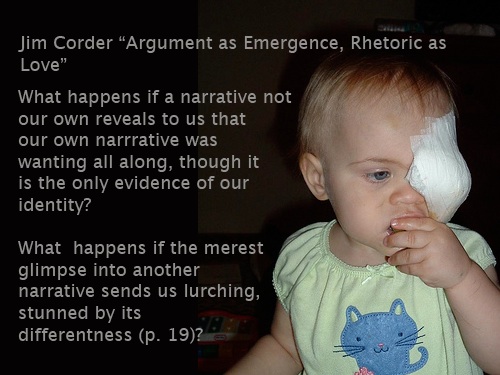
Rhetorical Support
The impact social media had upon my family doesn't necessarily end with diagnosing Rowan's cancer; it is not exhausted in the knowing about the cancer. It extends to how it provided us with emotional, and what I want to term rhetorical, support. My story suggests how one particular techno-social internet practice, social media and social networking, is transforming both the ways in which our stories shape us (emphasis on the quantity of the "our") and the ways in which our mass presence transforms our psycho-social reliance on stories. The definition of rhetorical support worked out here will draw upon and extend Jim Corder's (1985) exploration of narrative in his essay "Argument as Emergence, Rhetoric as Love" through a (albeit brief) discussion of Emmanuel Levinas's notion of asymmetrical intersubjectivity.
For Corder, all individuals "narrate" a story that locates them within the fabric of space and time. Rhetoric supports and facilitates consciousness; rhetorical narratives provide a frame of reference for understanding and navigating the world. The interruption of one's narrative disorients the subject, and requires revision. Rhetoric, for Corder, becomes a willingness to change one's narrative; when confronted by a distressing narrative, a rhetorical subject learns to turn inward ("Why don't I believe that?") rather than outward ("How can you believe that?"). How do we resist the innate and powerful urge to turn into a defensive jerk?
Here I would point to Julia Kristeva's (1991) conclusion in her recent Strangers to Ourselves:
To worry or to smile, such is the choice when we are assailed by the strange; our decision depends on how familiar we are with our own ghosts (p. 191).
Levinas' asymmetrical intersubjective ethics suggest that Corder's narration is not necessarily a conscious operation; rather it is extra-conscious activity that lays the ground from which consciousness emerges. Furthermore, I would argue that social media mean that we no longer individually narrate stories. Today's technology allows for a sense of self emanating from our networked existence with others: The linear plot is replaced by the matrixed assemblage (in that our lives come to be understood less in terms of a "where-have-I-been-and-where-will-I-go?" and more in terms of "who-am-I-[with]").These are not mutually exclusive.